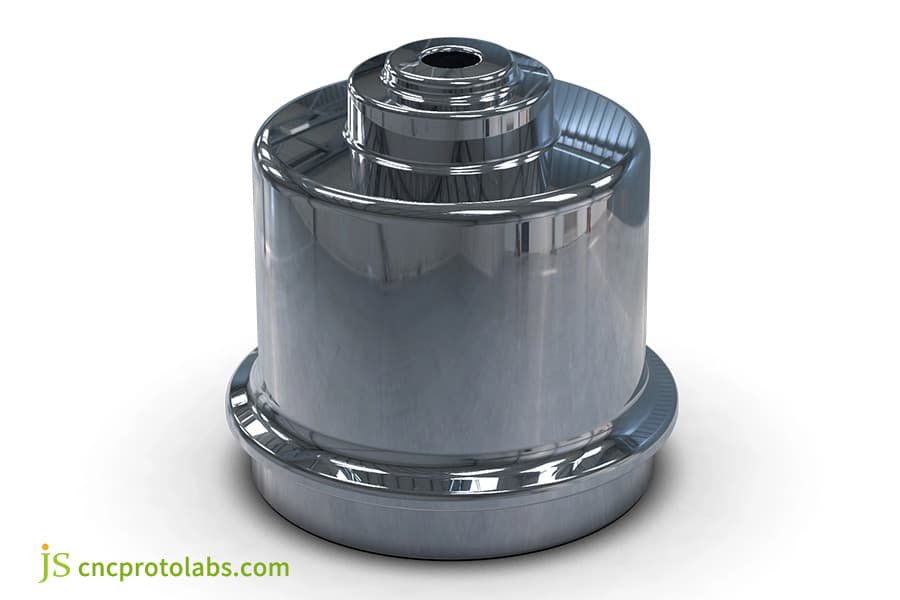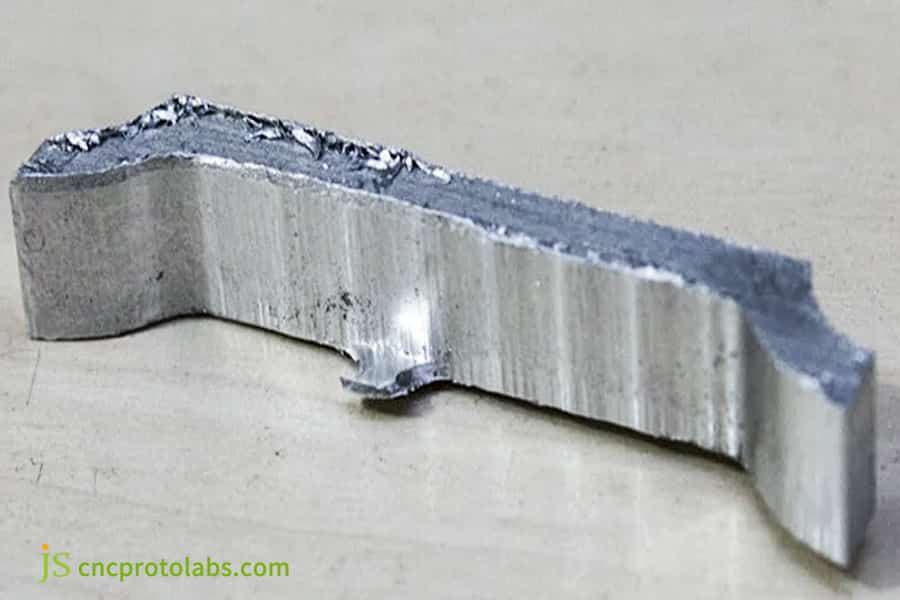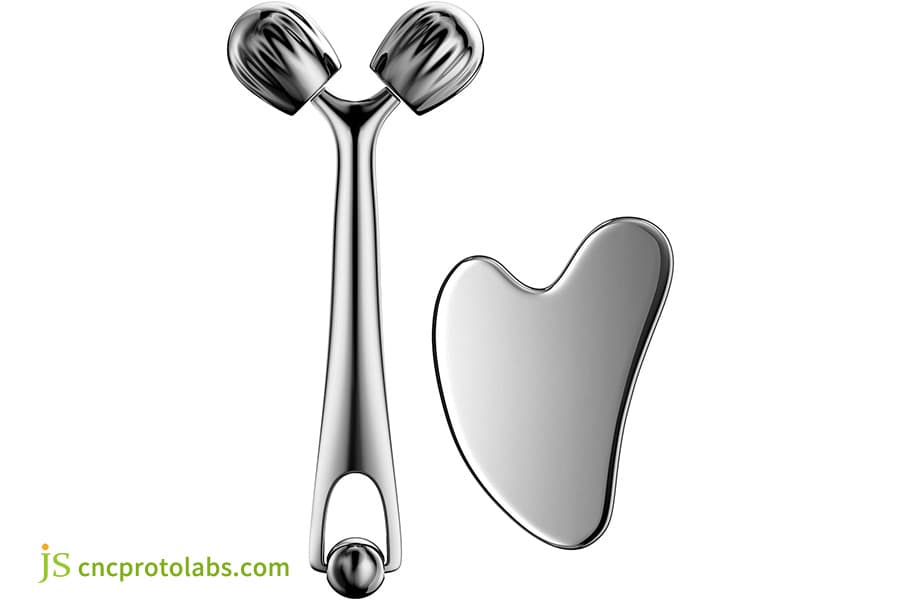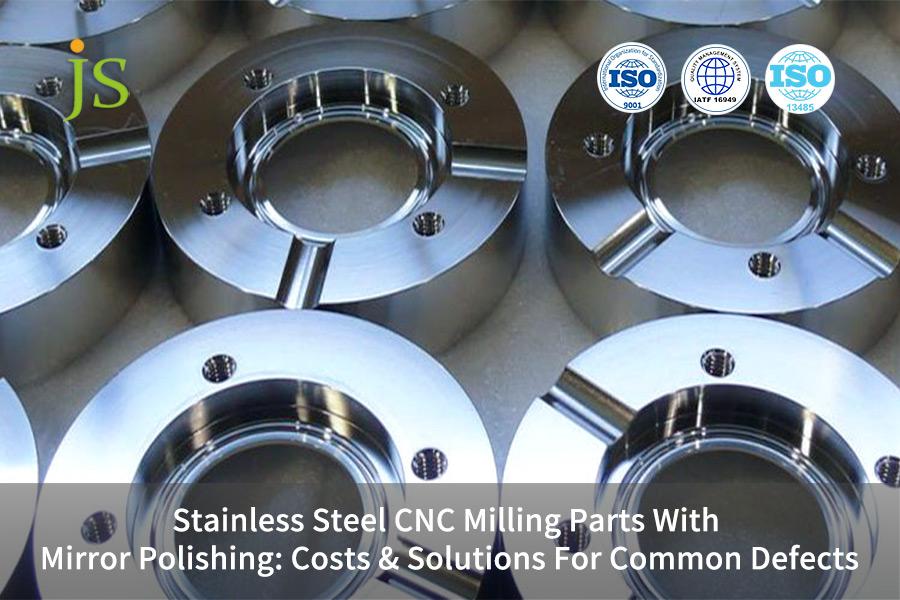CNC milling parts play a vital role in high-end production. The precision and quality of the surface finish of the critical parts of medical implants and beauty device cases have a direct influence on the performance of the final product.
The processing of metal parts from raw blanks to works of art with a mirror finish requires nothing short of the optimal blend of CNC processing and surface finishing.
In this article, we will critically evaluate the technological processes of high-precision CNC milling and mirror polishing of stainless steel components, unravel the components of CNC milling cost, as well as give an online guide on how to choose custom stainless steel parts manufacturer.
Core Answer Summary
| Core Topics | Key Takeaways | Value to You |
| High Precision and Mirror Finish | Mirror polishing(Ra≤0.1μm) is based on milling with Ra<0.4μm substrates, performed on 5-axis machine tools, maintaining temperature control. | It is necessary to comprehend the rationale of realizing elite surface quality, clarify demands, and exclude design errors. |
| Cost Analysis and Optimization | Cost is a factor of materials, machining time, and process complexity (polishing constitutes 30-50%), so cost can be managed by DFM optimization. | The cost structure should be explained, and the key point of cost negotiating optimization needs to be mastered. |
| Supplier Selection Strategy | E-commerce vendor selection targets machinery, material know-how, ISO 13485, and case studies in the industry. | Create a model of assessment such that the best providers can be easily seen. |
Key Takeaways
- Precision is the foundation of mirror finish: without precision-milled substrate with Ra less than 0.4 μm, it is impossible to get true stable uniform of the mirror finish.
- Cost is positively correlated with complexity: Deep cavities, sharp angles, and ultra-high surface finishes, such as Ra 0.05μm, increase the CNC milling cost exponentially, thus, manufacturability analysis is vital during the design phase.
- Material determines the polishing ceiling: 316L stainless steel is more suitable than 304 for applications of long-term corrosion-resistant mirror finish, incorrect material selection will lead to failure in polishing or premature failure.
- Partner selection is a quality prediction: A good custom stainless steel parts manufacturer should offer end-to-end engineering support from materials science to post-processing, more important than unit price.
Why Is JS Precision Trustworthy?
With 15 years of experience in CNC milling, JS Precision's trustworthiness as a professional manufacturer is based on solid technical strength, industry certification, and successful case studies.
We have over 20 5-axis CNC machining centers with positioning accuracy up to ±0.002mm, coupled with a temperature-controlled workshop of ±1°C, and precision testing equipment such as white light interferometers, ensuring every single CNC milling part meets the ultra-high precision standard.
With respect to our quality system, we are certified to ISO 9001, IATF 16949, and the medical industry-specific ISO 13485, thus responding to the most demanding requirements of several fields.
With over 500 high-end clients in the line of medical, beauty devices, and optics all over the world, we have been providing our services for many years. For an international brand of beauty devices, we attained much appreciation from the client with highly successful mass production of Ra 0.05μm ultra-mirror-finish housing with a consistently higher yield rate than 99.5%, producing 50,000 units monthly.
We also have a dedicated materials laboratory, enabling us to provide clients with optimized processing solutions for 304, 316L, and 17-4PH stainless steels, having solved over 1000 mirror polishing technical challenges.
If you are looking for a custom stainless steel parts manufacturer that balances precision, efficiency, and cost, please contact JS Precision's technical engineers. Tell them your part dimensions, surface requirements, and mass production needs, and we will provide you with free DFM analysis and customized solutions to help your project avoid unnecessary detours.
What Is CNC Milling Parts? From Basic Processing To Mirror Polishing
The understanding of the nature and process chain for making CNC milling parts must play a key role in realizing a mirror finish in the production process. The production process for such parts needs controlled management from the removal process to the mirror polishing stage.
CNC Milling And Mirror Polishing: How are they Defined?
CNC milling parts are accurate parts that require multi-dimensional material removal through rotary cutting tools based on numerical control programming. Mirror polishing is the peak of CNC milling technology, where the surface roughness is reduced to Ra ≤ 0.1 μm (as low as Ra 0.025 μm) through either mechanical or electrolytic techniques, capable of reflecting a mirror image.
The surface roughness values for each processing stage are clearly successively increasing:
| Machining Stage | Surface Roughness Ra Value | Commonly Used Tool Types | Cutting Speed Range (m/min) | Machining Objective |
| Roughing | 3.2-6.3μm | Carbide End Mill | 100-150 | Quickly remove excess material and form the approximate shape. |
| Semi-finishing | 1.6-3.2μm | Coated Carbide End Mill | 150-200 | Refine the part structure and prepare for finishing. |
| Finishing | 0.4-0.8μm | Micrograined Carbide End Mill | 200-300 | Ensure part dimensional accuracy and surface uniformity, laying the foundation for mirror polishing. |
| Mirror Pretreatment | 0.1-0.4μm | Diamond Coated End Mill | 300-400 | Achieve ultimate surface quality. |
In what manner is the process flow for a mirror finish?
A mirror finish is obtained by a combination of processes: Rough milling→ Semi-finish milling→ Finish milling→ Stress relief→ Multi-pass mirror polishing.
In these stages, key operations include: Deformation prevention by means of rough milling and semi-finishing milling. Surface finish quality by finish milling, with Ra<0.4μm, which prevents polishing flaws. Deformation prevention by stress relief. Mirror polishing by progressive grinding using sandpaper with grades ranging from 400# to 1500# and diamond paste.
Interested in verifying compatibility for the process of part assembly? JS Precision invites 3D drawings of the components for a free assessment of their suitability, giving CNC milling parts the best possible finish - a mirror finish.
 Figure 1 The surface smoothness of the mirror effect is extremely fine, ensuring high reflectivity and no visible defects on the surface.
Figure 1 The surface smoothness of the mirror effect is extremely fine, ensuring high reflectivity and no visible defects on the surface.
How To Achieve Mirror Effect Through High Precision CNC Milling?
The basis of a mirror finish is high-precision CNC milling, without precision machining, a consistent mirror surface cannot be maintained.
What is high-precision milling but the final cut?
High-precision CNC milling is a systems engineering project. The requirement of polishing adaptability, according to JS Precision, can therefore be met by ensuring the following conditions:
- High-rigidity 5-axis machine tool with positioning accuracy ±0.002mm.
- ±1°C constant temperature workshop to avoid thermal deformation.
- Microcrystalline carbide or diamond-coated cutting tools.
- Dedicated stainless steel cutting parameter database.
What key technologies ensure a perfect substrate before polishing?
- 5-axis linkage reduces clamping errors and adapts to complex curved surfaces.
- High-quality cutting tools avoid cutting edge and prevent surface defects.
- High-speed cutting combined with oil-based coolant prevents overheating and hardening.
- Online detection and real-time parameter adjustment ensure accuracy.
How Is CNC Milling Cost Composed? Decoding The Price Of Stainless Steel Mirror Parts
CNC milling cost is a key decision-making factor. Understanding its structure and optimization methods can maximize your budget.
What are the core factors driving costs?
Core driving factors and percentages of CNC milling cost for stainless steel mirror parts:
| Cost Composition | Percentage Range | Key Influencing Factors |
| Material Cost | 20%-30% | Material type (304/316L/17-4PH), material specifications |
| Programming and Machine Time Cost | 30%-40% | Part complexity, machining accuracy requirements |
| Process Complexity Cost | 25%-35% | Polishing requirements (Ra value), post-processing steps |
| Inspection and Loss Cost | 5%-10% | Inspection items, consumable losses |
How can the budget be effectively controlled and an accurate quotation obtained?
- Provide complete 3D drawings, tolerances, and Ra value requirements.
- Optimizing DFM, eliminating sharp corners in favor of rounded corners, simplifying deep cavities.
- Choose materials based on what is needed, with 316-L being preferred for corrosive conditions.
- Ideally plan batch sizes to minimize fix cost per item.
Want to quickly obtain accurate CNC milling cost quotes? Please do not hesitate to contact JS Precision, providing us with your part technical parameters as well as your intended purchase quantity, and we will send you a cost accounting report as well as 3-5 cost-optimization solutions.
What Are The Common Defects Of Stainless Steel Mirror Polishing? Reasons And Solutions
JS Precision presents the reasons and solutions for four typical problems in mirror polishing to help you prevent potential risks.
Defect 1: Scratch(es) and Orange Peel
- Reasons: Uneven substrate, improper polishing parameters, deep tool marks, and high impurities in consumables.
- Solutions: Ra of the substrate must be less than 0.4 μm, progressive polishing, high purity materials, and oil coolant.
Defect 2: Sharp Edge Chipping
- Reasons: Tool wear, Too high feed rate, Inability to reach sharp edge by polishing.
- Solutions: Tool change on schedule, optimize cutting params, design fillet radius, chemical or thermal deburring.
Defect 3: Uneven Mirror Surface/Reflection
- Reasons: Untracted stress, Inconsistent material quality, Inconsistent polishing of complex structures.
- Solutions: Stress removal through pre-treatment, choosing materials with good stability, electropolishing of complex-shaped parts.
Defect 4: Workpiece
- Reasons: Heating when cutting, tool wear, inadequate cooling fluids.
- Solutions: Sharp tools, sufficient coolant, and properly set cutting parameters.
 Figure 2 Burrs are actually deformed materials that remain at the edges of the workpiece in the form of thin films, which are very sharp and must be removed.
Figure 2 Burrs are actually deformed materials that remain at the edges of the workpiece in the form of thin films, which are very sharp and must be removed.
How To Choose The Right Material For Mirror Polishing In Metal CNC Milling?
Materials are the "upper limit determiner" of mirror polishing effects in metal CNC milling. Different stainless steels have different compositions, hardness, and corrosion resistance, resulting in significant differences in polishing difficulty and final effect. Choosing the right material is a prerequisite for successful mirror polishing.
304, 316L, 17-4PH – which is the king of mirror finishes?
Performance comparison of three mainstream stainless steels in mirror polishing applications:
| Material Type | Mirror Polishing Performance | Corrosion Resistance | Mechanical Strength | Processing Difficulty | Applicable Scenarios |
| 304 Stainless Steel | Good, Ra can be as low as 0.05μm | Average, not resistant to salt spray and strong acid environments | Medium | Low | Indoor environments, non-corrosive scenarios, such as ordinary decorative parts |
| 316L Stainless Steel | Excellent, Ra can stably reach 0.025μm | Excellent, resistant to salt spray, strong acids and alkalis, good biocompatibility | Above-average | Medium | Demanding scenarios such as medical implants, beauty devices, marine environments, and the food industry |
| 17-4PH Stainless Steel | Good, Ra can be as low as 0.05μm | Good, better than 304, slightly inferior to 316L | High, hardness after heat treatment can reach HRC40 or higher | High | Structural parts requiring high strength, such as precision mechanical parts |
With comprehensive consideration in performance, 316L stainless steel has the best service in the process of mirror polishing and is suitable for applications with high demands for corrosion resistance and surface stability.
What are the effects of incorrect material selection?
Incorrect material selection is one of the most common causes of failures when it comes to mirror polishing, and the effects are mostly irreversible:
- 304 stainless steel is used in salt spray environments or medical settings. Even if an initial polishing can achieve a mirror finish, it will pit and rust after a certain period of use, losing its luster and sometimes even affecting the product's functionality.
- 17-4PH stainless steel has high hardness and tends to have surface "tearing" while polishing if it is not appropriately heat-treated, which cannot produce a consistent mirror finish.
- If inferior stainless steel with higher impurity content is selected, the result would be black spots on the ground and many pits, whichever quantity of polishing may be done to achieve the desired effect.
- 304 stainless steel is susceptible to rusting and tarnishing when exposed to salt spray/medical conditions.
- Inappropriate heating treatment of 17-4PH stainless steel materials prone to tears when polishing.
From Drawings To Ra 0.05 μ m: How JS Precision Can Help High-End Beauty Devices Achieve Mass Production Of Stainless Steel Mirror Shells
Integration of complex shapes with ultra-mirror effects is one of the biggest challenges in high-end manufacturing. JS Precision identified an opportunity in this area and has successfully implemented the mass production of mirror finish shells for an international beauty device company.
Challenge
For this brand, the production of 316L stainless steel shells with complex curved surfaces was required.
The requirements were: extreme reflectivity similar to a mirror with Ra 0.05 μm, no scratches, no orange peel effect, a monthly production of 50,000 units, and a yield ratio of at least 99%.
JS Precision Solutions
- Cooperative Design Optimization: Close collaboration with the client regarding improvement suggestions for sharper internal corners with a 0.5mm radius, optimizing the demolding angle, polishing accessibility, and stress during processing.
- Innovative Process Chain: Use an integrated process chain of "five-axis high-speed precision milling (Ra 0.3μm) → vibratory grinding for stress relief → diamond paste polishing → electrolytic polishing" for uniform polishing results.
- Mass Production Quality Assurance: To produce specific tooling and automate production, while using a white light interferometer to measure in real time the Ra value, which should be 0.05 ± 0.01 μm, and batch control.
Results
The project successfully cleared the sample sealing process at the first try, with a mass production rate of passage of more than 99.5% and a delivery rate of 50,000 units a month. With the mirror-finish packaging, it has now emerged as a hallmark of the company and helped establish JS Precision as a leader in custom stainless steel parts production.
Do you also want to achieve ultra-mirror-finish mass production of complex parts? Contact JS Precision, share your project challenges, and we will provide you with full-process support from design optimization to mass production implementation, making your products stand out in the market.
 Figure 3 Stainless steel mirror shell for beauty device
Figure 3 Stainless steel mirror shell for beauty device
How To Screen For Truly Professional Custom Stainless Steel Parts Manufacturers Online?
The screening of CNC milling parts online suppliers should focus on core indicators rather than simply comparing prices in order to identify professional custom stainless steel parts manufacturer.
What key indicators must be examined when making online inquiries?
1. Equipment Capabilities: 5-axis machine tools, precision polishing machines, and test equipment.
2. Material Knowledge: Knowledge related to the material selection, processing, characteristics.
3. Quality Certifications: ISO 9001 and industry-specific (e.g., ISO 13485).
4. Case Studies & Reports: Example case studies of mirror polishing in the same industry as well as test reports.
5. Engineering Support: The capabilities for DFM optimization and process evaluation.
Why are experience and case studies more important than low price promises?
Mirror polishing relies on process techniques, and low prices can easily lead to substandard quality and delayed delivery.
Custom stainless steel parts manufacturers with rich high-end industry cases can predict and solve processing difficulties, save time costs and quality risks, and have value far exceeding low price differences.
Need to quickly screen suppliers? Contact JS Precision with the note "Evaluation Checklist" to receive a free "CNC Milling Parts Online Evaluation Checklist" containing 10 core indicators, enabling efficient identification of high-quality partners.
FAQs
Q1: What is the highest surface roughness (Ra) achievable with mirror polishing?
For stainless steel components, a maximum value of Ra=0.025 μm can be achieved by mechanical polishing, creating a mirror reflection, while an average value of Ra=0.1 μm can be achieved by electrolytic polishing, where the components will be more suited for complex geometries.
Q2: Is 5-axis CNC milling necessary for mirror-finish parts?
In the case of simple planar components, precise 3-axis CNC machining can be sufficient, in other cases with complex curved surfaces, deep cavities, or multi-faceted components with a mirror finish, 5-axis CNC machining can greatly decrease errors in the fabrication process.
Q3: When providing drawings, besides dimensions, what surface requirements must be specified?
Surface roughness value Ra (for example, "mirror surface Ra 0.1μm"), gloss requirements, critical surface area, and conditions of operation in which the part might be subjected (for example, if it comes into contact with corrosives) should also be specified. These factors can directly influence processing choices and costs.
Q4: What is the typical minimum order quantity (MOQ) for small-batch custom mirror-finish parts?
Companies such as JS Precision, professional custom stainless steel parts manufacturer, offer trial production with a production quantity of 1-10 pieces for clients in the product development stage, which can then proceed to mass production depending on the need.
Q5: How is processing time estimated? What factors are most time-consuming?
Processing time is calculated through the use of CAM simulation software and through the process itself. Primarily dependent on part complexity, surface finish, and batch size, the most time-consuming parts include deep cavity finishing, corner cleaning, and mirror polishing, which collectively account for over 70% of the overall time spent in machining the parts.
Q6: How to ensure consistent mirror finish for every part during mass production?
Standardized polishing factors, specific brands and models of tools and materials, controlled workshop environmental conditions (temperature and dust-free environment), and Statistical Process Control (SPC) are needed. Sampling inspection of products in batches is also carried out to ensure consistency.
Q7: Besides stainless steel, what other metals can you provide mirror polishing for?
Apart from stainless steel, aluminum alloys, titanium alloys, tool steel, and other metals, there are other materials that can be mirror polished. The polishing parameters differ from one material to another. JS Precision knows how to mirror polish metals, as they have vast experience in carrying out such processes.
Q8: How long does it typically take from inquiry to receiving a sample?
For mirror finish parts of normal complexity, JS Precision will be able to ship the first sample in 2-3 weeks after receiving the final drawings and confirmation of material delivery. A report on complete size inspection and a report on surface roughness inspection are also provided.
Summary
From scratch blanks to mirror finish masterpieces, the process of CNC milling components is the best possible blend of precision, craftsmanship, and material science.
JS Precision, with 15 years of deep cultivation and accumulation, has honed high precision CNC milling and mirror polishing techniques to perfection. With transparent CNC milling cost accounting, scientific material selection recommendations, and strict quality control, we creates high-quality customized parts for global customers.
Are you having problems with the accuracy, pricing, and suppliers for mirror finish components? JS Precision stands by to be the answer that counts on you.
Please go to our website, send us your CAD files, and get an instant quotation through our process analysis. This is how we can achieve our goal of creating precision reality from your designs.
Disclaimer
The contents of this page are for informational purposes only.JS Precision Services,there are no representations or warranties, express or implied, as to the accuracy, completeness or validity of the information. It should not be inferred that a third-party supplier or manufacturer will provide performance parameters, geometric tolerances, specific design characteristics, material quality and type or workmanship through the JS Precision Network. It's the buyer's responsibility Require parts quotation Identify specific requirements for these sections.Please contact us for more information.
JS Precision Team
JS Precision is an industry-leading company, focus on custom manufacturing solutions. We have over 20 years of experience with over 5,000 customers, and we focus on high precisionCNC machining,Sheet metal manufacturing,3D printing,Injection molding,Metal stamping,and other one-stop manufacturing services.
Our factory is equipped with over 100 state-of-the-art 5-axis machining centers, ISO 9001:2015 certified. We provide fast, efficient and high-quality manufacturing solutions to customers in more than 150 countries around the world. Whether it is small volume production or large-scale customization, we can meet your needs with the fastest delivery within 24 hours. Choose JS Precision this means selection efficiency, quality and professionalism.
To learn more, visit our website:www.cncprotolabs.com





